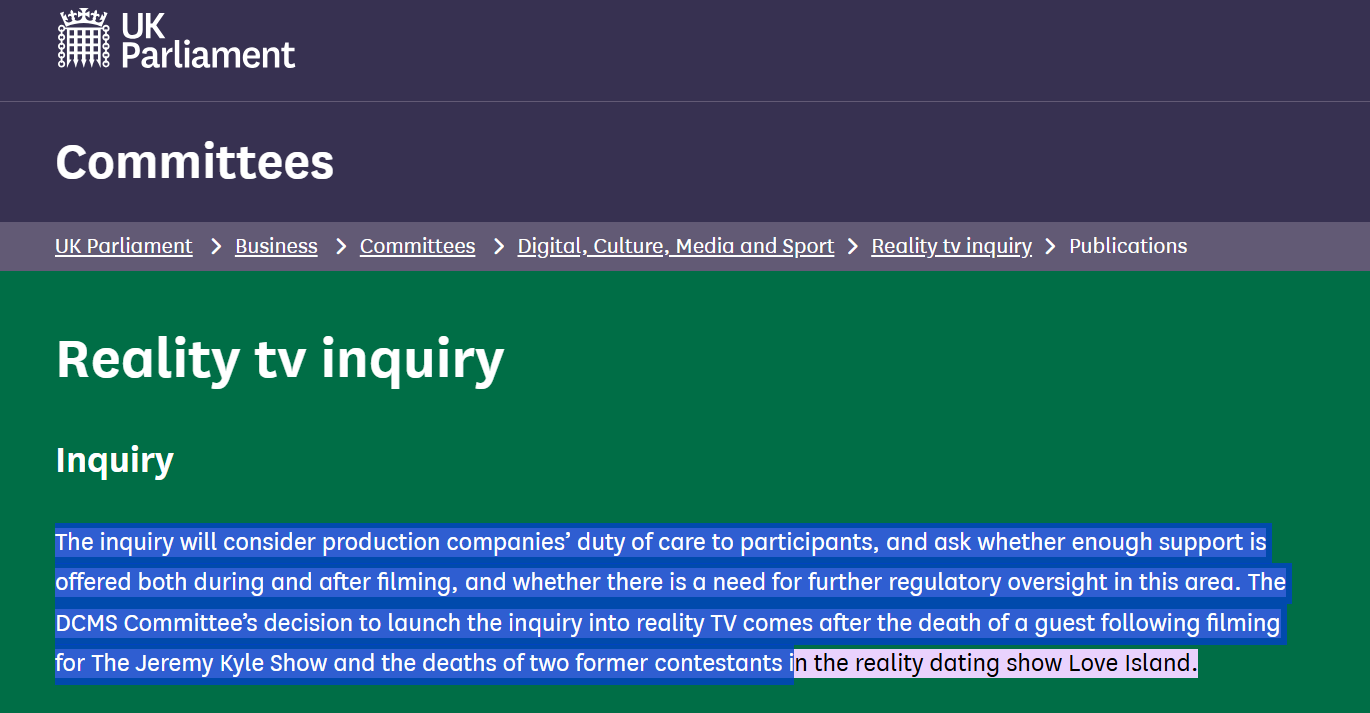Hot Take: Cierra’s Exit from Love Island represents a Bigger Problem for Reality TV
(Journalistic Opinion)//Posting my rejected pitches from work
In a politically chaotic time, Love Island allows Americans to be collectively invested in shaping the outcomes for their fellow citizens.
American Idol enjoyed a similar reception in a post 9/11 world. As Americans watched their brothers, fathers, and sons be shipped off to a war waged overseas, American Idol was the one place where their voices were heard through the show’s integrated online voting. Similarly, Americans now feel underrepresented by overseas strikes on Iran, ICE detainments of their neighbors, and trickle-down-tariffs. We may not have control over our legislation, but we do have control over whether an islander gets booted from “our” villa.
 Tiktok failed to load.
Tiktok failed to load.Enable 3rd party cookies or use another browser
But as we see rooms of young people cheer for the removal of islanders Yulissa Escobar and Cierra Ortega for their frequent use of racial slurs, are we so convinced this is a reflection of America’s will to have inclusive cast members? Or a reflection of a viewing culture that historically loves to dogpile and punish women of color on national television?
Make no mistake, Love Island producers should have removed Yulissa and Cierra (and even prevented their participation in the casting process). No one is entitled to a platform or brand sponsorship deals, especially not racist influencers with a past full of “teachable moments.” But online death threats and allegedly calling ICE on Cierra’s family go beyond wanting social justice and “accountability” from Love Island stars. Cierra has since apologized in a TikTok post, but only time will tell if a binary internet will accept it.
Outside of racist moments, the internet reveled in islander Huda Mustafa’s “crash-outs,” calling her abusive for raising her voice at islander Jeremiah (who himself admitted in a later interview that he did not communicate the best; Huda is not the only island to raise her voice at another contestant). This is the same internet culture that idolizes Sammi Giancola’s physical beating of her then on-screen boyfriend, Ronnie Ortiz-Magro on Jersey Shore’s first season. Ortiz-Magro still experiences a lot of online vitriol regarding as a victim of domestic violence regarding his on-screen abusive relationship in Jersey Shore: Family Vacation with his former wife.
Huda may not be the best communicator, but does she deserve to have people making jokes about calling CPS on her child? The show has built its success in part thanks to her sacrifice to be the internet’s scapegoat. With many people online admitting they started watching to be entertained by her meltdowns. We’re not drawn to the fire pit for love of coupling but to hate on. single women
There are ethical questions and safety concerns that this new era of Love Island and Reality TV in general will need to address. Sure, Love Island USA has on-site therapists and added anti-bullying programming. Ariana Madix herself publicly disavowed the online hate in a recent Aftersun recap episode. But is this enough to protect the physical safety and mental health of cast members? After all, this is the same show that saw three UK cast members commit suicide in the wake of online scrutiny, spawning such a conversation online that members of Parliament created legislation to address the producer’s responsibility to protect their contestants back in 2020.

Meanwhile, islander Austin Shepard also had some troubling social media reposts denigrating Kamala Harris and Black women. Yet, he remains unscathed online and enjoys no social responsibility to the fandom. His active conservatism displayed online (which he is entitled to express) has not received the same scrutiny as his more perceived left-leaning co-contestants, despite also representing the Love Island Brand. He will most likely be able to attend the upcoming reunion, whereas Ortega and Escobar likely won’t be invited back by the producers.
Which begs the question in an online ecosystem seeking to punish racism and discriminatory beliefs: are we punishing everyone equally? Or simply the women we have pre-determined beliefs about? Is internalized misogyny in viewers fueling the hate parade?
Outside of vague, anti-bullying graphic cards on-air, Love Island has yet to make a public statement to the press or on their platforms to address or condemn the racist rhetoric used by any of their islanders (intravilla or excommunicated).
A new bombshell has entered the villa for Love Island US producers: how to balance corporate social responsibility with contestants’ physical safety, both online and off.








